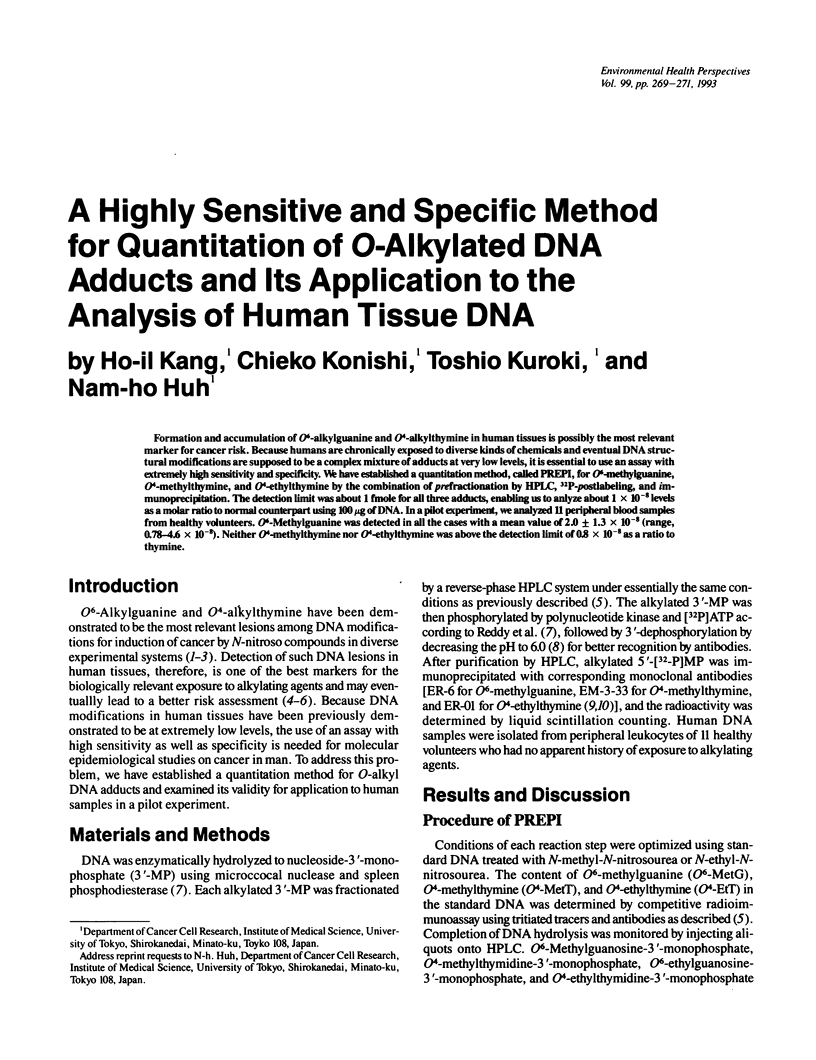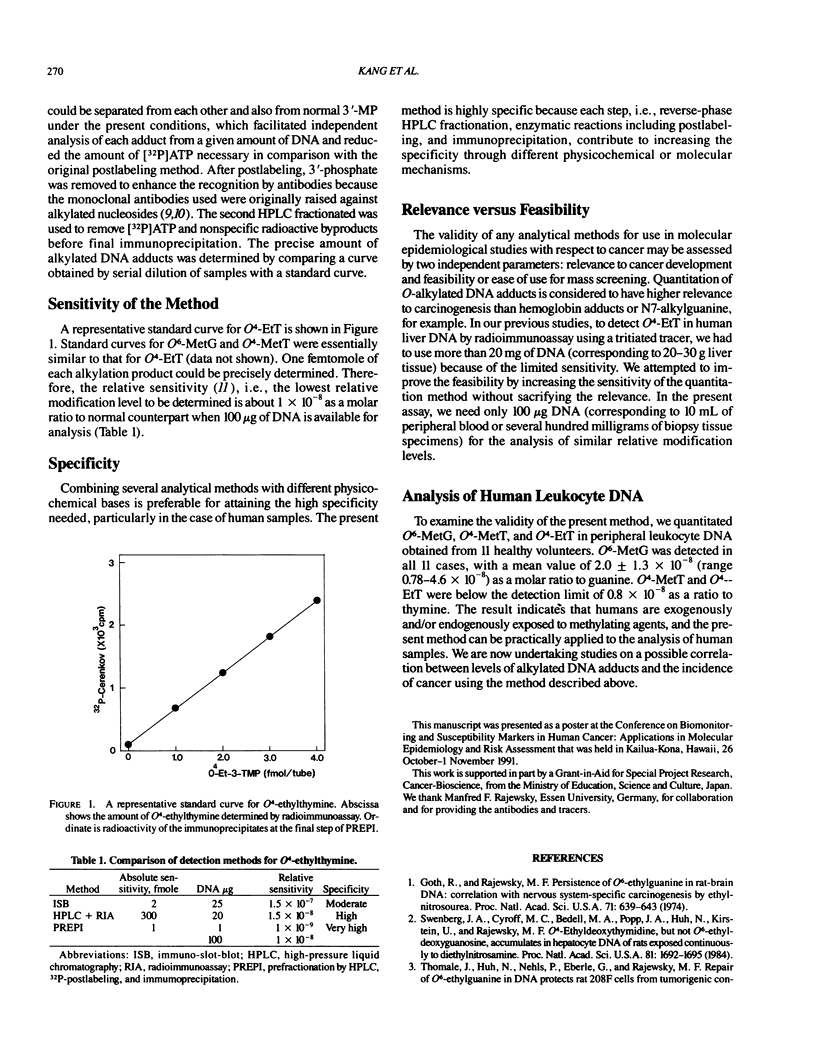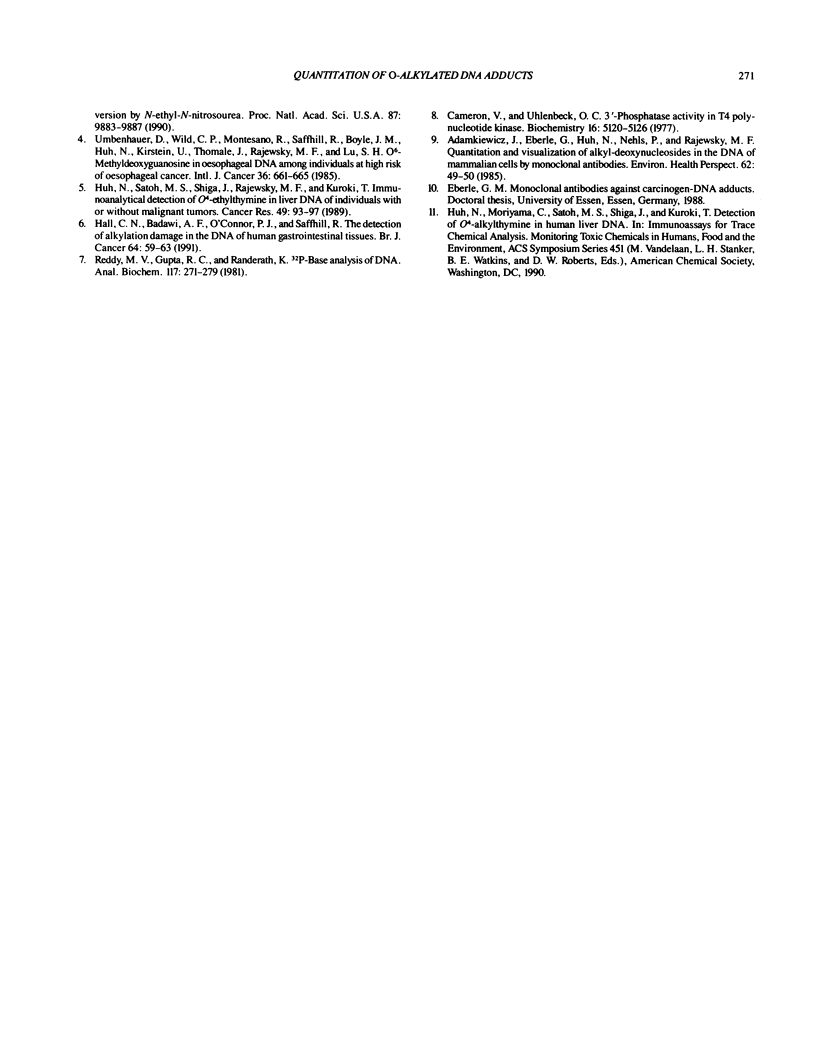Abstract
Formation and accumulation of O6-alkylguanine and O4-alkylthymine in human tissues is possibly the most relevant marker for cancer risk. Because humans are chronically exposed to diverse kinds of chemicals and eventual DNA structural modifications are supposed to be a complex mixture of adducts at very low levels, it is essential to use an assay with extremely high sensitivity and specificity. We have established a quantitation method, called PREPI, for O6-methylguanine, O4-methylthymine, and O4-ethylthymine by the combination of prefractionation by HPLC, 32P-postlabeling, and immunoprecipitation. The detection limit was about 1 fmole for all three adducts, enabling us to analyze about 1 x 10(-8) levels as a molar ratio to normal counterpart using 100 micrograms of DNA. In a pilot experiment, we analyzed 11 peripheral blood samples from healthy volunteers. O6-Methylguanine was detected in all the cases with a mean value of 2.0 +/- 1.3 x 10(-8) (range, 0.78-4.6 x 10(-8)). Neither O4-methylthymine nor O4-ethylthymine was above the detection limit of 0.8 x 10(-8) as a ratio to thymine.
Full text
PDF


Selected References
These references are in PubMed. This may not be the complete list of references from this article.
- Cameron V., Uhlenbeck O. C. 3'-Phosphatase activity in T4 polynucleotide kinase. Biochemistry. 1977 Nov 15;16(23):5120–5126. doi: 10.1021/bi00642a027. [DOI] [PubMed] [Google Scholar]
- Goth R., Rajewsky M. F. Persistence of O6-ethylguanine in rat-brain DNA: correlation with nervous system-specific carcinogenesis by ethylnitrosourea. Proc Natl Acad Sci U S A. 1974 Mar;71(3):639–643. doi: 10.1073/pnas.71.3.639. [DOI] [PMC free article] [PubMed] [Google Scholar]
- Hall C. N., Badawi A. F., O'Connor P. J., Saffhill R. The detection of alkylation damage in the DNA of human gastrointestinal tissues. Br J Cancer. 1991 Jul;64(1):59–63. doi: 10.1038/bjc.1991.239. [DOI] [PMC free article] [PubMed] [Google Scholar]
- Huh N. H., Satoh M. S., Shiga J., Rajewsky M. F., Kuroki T. Immunoanalytical detection of O4-ethylthymine in liver DNA of individuals with or without malignant tumors. Cancer Res. 1989 Jan 1;49(1):93–97. [PubMed] [Google Scholar]
- Reddy M. V., Gupta R. C., Randerath K. 32P-base analysis of DNA. Anal Biochem. 1981 Nov 1;117(2):271–279. doi: 10.1016/0003-2697(81)90722-3. [DOI] [PubMed] [Google Scholar]
- Swenberg J. A., Dyroff M. C., Bedell M. A., Popp J. A., Huh N., Kirstein U., Rajewsky M. F. O4-ethyldeoxythymidine, but not O6-ethyldeoxyguanosine, accumulates in hepatocyte DNA of rats exposed continuously to diethylnitrosamine. Proc Natl Acad Sci U S A. 1984 Mar;81(6):1692–1695. doi: 10.1073/pnas.81.6.1692. [DOI] [PMC free article] [PubMed] [Google Scholar]
- Umbenhauer D., Wild C. P., Montesano R., Saffhill R., Boyle J. M., Huh N., Kirstein U., Thomale J., Rajewsky M. F., Lu S. H. O(6)-methyldeoxyguanosine in oesophageal DNA among individuals at high risk of oesophageal cancer. Int J Cancer. 1985 Dec 15;36(6):661–665. doi: 10.1002/ijc.2910360607. [DOI] [PubMed] [Google Scholar]


